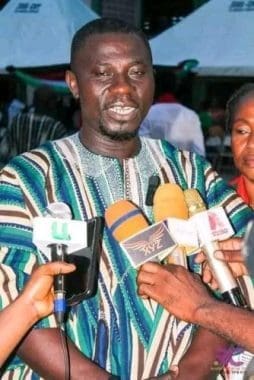Technology
Ashaiman MP, Hon .Dr. Ernest Norgbey Engages Communities
…Residents Demand Schools, Roads and Water; MP Pledges Delivery
As part of a post-election “thank-you” tour, Ashaiman Member of Parliament, Hon. Dr.Ernest Norgbey in collaboration for Growth engage a dozen communities in his constituency today.
Residents who used the opportunity to press him for urgently needed development projects, notably new schools, improved roads and reliable water supply.The engagement; billed by the MP as a gesture of gratitude to voters after the 2024 elections, took Hon. Ernest to villages and townships across the constituency where he held community meetings, listened to concerns and reaffirmed campaign commitments.According to organisers, the engagement were deliberately grassroots in scope, intended to allow face-to-face conversations with chiefs, assembly members, market women, youth and health workers.Community needs laid bareIn each stop, recurring themes emerged. Parents asked for additional classroom blocks or refurbishment of existing facilities to ease overcrowding and improve teaching and learning conditions. Road users and commercial drivers pleaded for the grading and surfacing of feeder roads that are often impassable in the rainy season, increasing transport costs and isolating communities.Women and school principals urged the MP to prioritise potable water projects to reduce waterborne diseases and save children long walks to distant boreholes.Health concerns were also raised. Community health volunteers and clinic staff appealed for improved staffing, equipment, and medicines at local health posts requests Hon. Dr. Ernest Norgbey said he took seriously.“People were clear about what they need,” a local assembly member who attended several of the engagements told this paper. “They want practical interventions — classrooms, tarred roads, boreholes and better clinic support. They want to see projects and they want timelines.”MP pledges to honour campaign promisesResponding to the appeals, Hon. Dr. Ernest Norgbey told residents that his engagement was the start — not the end — of constituency engagement.He reiterated assurances he gave during the 2024 campaign, saying he would work to mobilise resources and coordinate actions with central government agencies, the Municipal Assembly and development partners to deliver the projects.“During the campaign I made promises to this constituency and today I am here to tell you I intend to keep them,” Hon. Ernest Norgbey said during one public meeting. “We will prioritise schools, roads and water; we will work with the Municipal Assembly and relevant ministries to secure funding and get contractors on site.”He outlined a multi-track approach — combining constituency-level interventions (using the MP’s office and constituency development funds), lobbying for central government projects, and seeking partnerships with NGOs and private sector actors — as the pathway to meeting the communities’ demands. The MP also called for patience and community cooperation in monitoring projects and protecting completed facilities.“We ap said a chief from one of the communities. Parents similarly said they would hold their elected representative to account.A teacher at a primary school in one of the visited towns described the MP’s promise as encouraging but said immediate action was needed.Turning pledges into projects will require funding, technical planning and inter-agency coordination. Sources of financing typically include the central government’s sector budgets, the Municipal Assembly Common Fund, GETFund (for education infrastructure), MPs’ Constituency Development Funds, donor or NGO support, and public-private partnerships.Projects such as road surfacing often require feasibility studies and approvals from agencies like the Department of Urban Roads and the Ghana Highway Authority.Development partners and local officials will need to be brought on board quickly if the MP’s commitments are to be realised before the next budget cycle.Community monitoring committees — made up of traditional leaders, youth and women’s groups — could help ensure transparency and guard against delays or misuse of resources.Why this mattersAshaiman Constituency requests reflect a broader reality in many Ghanaian constituencies: voters expect visible development — classrooms, clinics, water and roads — and increasingly demand that MPs deliver practical benefits, not only rhetoric. How Hon Mp moves from promise to project will determine local confidence in his leadership and could shape political fortunes in subsequent elections.A test of accountabilityResidents say they will watch closely. “We vote and we hope,” one mother commented. “Now we will monitor the work. If the MP delivers, he will have our continued support. If not, we will ask questions.”


